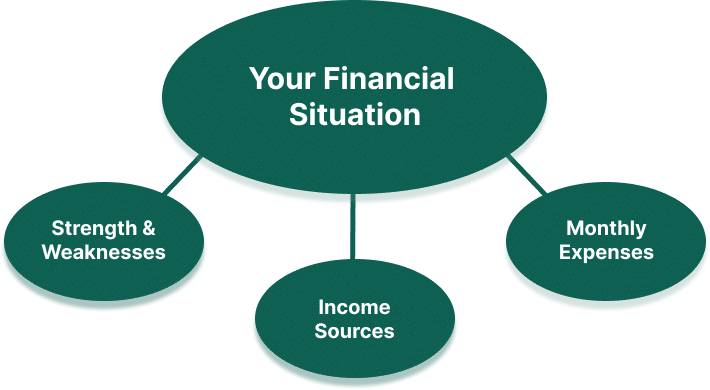A recession is a period of economic downturn that can affect governments, businesses, and individuals. Recessions often include higher unemployment, stagnant wage growth, and reduced consumer spending. Recessions are unavoidable and unpredictable in the big picture, but you can adjust your financial strategy to account for them. Preparing for a recession is a good practice no matter where the economy is, and preparation can help you avoid any severe impacts.
Let’s take a closer look at how to financially prepare for a recession. We’ll review how you can better protect your finances and how the right financial advisor can help.
Building A Better Understanding Of Recessions
Calling a recession is a little like calling balls and strikes in baseball. Some calls are easy, but others are on the margin; was that a ball or just inside the box and a strike?
There is no formal definition of recession, but most analysts consider two consecutive quarters of decline in a country’s inflation-adjusted gross domestic product (GDP) to signal that we are in a recession.
That’s fairly general, and the National Bureau of Economic Research (NBER) has tightened its definition to mean that there is a “significant” decline spread across the economy – rather than isolated to one or two sectors – and that the decline is visible in production, employment, and income.
If a recession is severe enough, it’s called a depression. The last severe depression in the United States was the “Great Depression,” which also affected the world economy. Historians usually point to the period from 1929 through 1939, but the reality is that this period saw several significant recessions with recoveries in between. Nonetheless, it represents the longest and most severe period of negative economic growth we’ve seen in our history.
What Causes a Recession?
Several factors can cause recessions. Usually, the decline starts somewhere and then spreads to other areas. If a decline in one area doesn’t affect others, a recession will most likely not develop. As used by the NBER, these key areas would be production, employment, and income. Any outside factor that hits one of those areas significantly enough for that area to then hurt the other areas will likely trigger the cascading effect, which is the recession.
For example, a supply restriction on a key element used in manufacturing a wide variety of products would hurt production. If the restriction is severe enough and production is cut back to the point where workers are laid off, this would affect employment and ultimately reduce incomes, further slowing down the economy. At a certain point, enough production, employment, and income decrease to become a recession.
Unwise policy decisions in Washington D.C. can also have a negative impact on these core economic elements. From time to time, tariff policies have been extreme enough that imports were no longer financially attractive, and domestic replacements were unavailable. Production was thus restricted to the point where employment and income diminished.
Mismanagement of interest rates by the Federal Reserve often causes recessions. Loans are a key production component – most companies borrow money – and most homeowners rely on mortgages to purchase their homes. A significant increase in interest rates hurts companies – resulting in a cutback on production, and hurts buyers – resulting in high interest debt and a cutback on purchases. Cutbacks of this type are often severe enough to cause a recession.
Many commentators have pointed to the business cycle as a cause of recession. In this view, business cycles are defined enough to see the expansion and plot the downturn. We disagree with this view. No economic law or principle dictates that an expansion in economic activity will lead to a recession. Recessions represent the “end” of a general economic expansion, but that’s not the same as saying that the expansion inevitably causes recessions.
Fortunately, recessions do not last forever. In fact, they typically last only a few months, at the short end of the spectrum, to a few years at the longer end. In the grand scheme of things, a few years is relatively short given our economy’s long history. Still, a two-year recession will certainly feel significant to most people and perhaps even crippling to the financial stability of some.
The difference between a recession being inconvenient versus crippling often depends on the preparations you’ve taken. Even though you can accurately predict the timing of a recession, preparing yourself for a potential recession beforehand is a great practice, even in the best of times. As they say, an ounce of prevention is worth a pound of cure.
How To Be Prepared For A Recession
A recent survey indicates that 31% of Americans have started taking steps to prepare for a recession. That’s great, but it means 69% of Americans have NOT started preparing for a recession. The most likely reason for such widespread complacency is the feeling that you don’t need to prepare for a recession until you “see the signs” of a looming recession. This thought process is foolish since recessions are not specifically predictable; when you “see the signs,” there won’t be time to prepare. It’s wise to always be prepared, no matter the current economic conditions.
Get Prepared With a Plan
It all starts with a plan. Preparing for a recession requires good planning. If you don’t have a detailed financial plan in place, you won’t be able to protect yourself from a recession. Most people think of a financial plan in terms of preparing for retirement. That’s true, but a good financial plan doesn’t assume that the economy will always hum along. A good plan anticipates several recessions along the way.
You need to understand your current financial situation, including strengths and weaknesses. You should understand how susceptible your income sources are to a recession and what you can do to shore them up.
On the expense side of the equation, a good financial plan identifies all your monthly expenses, compares them against income, and helps you understand how much of a cashflow surplus you need during good times to prepare for retirement. It also helps identify where to cut back to better prepare for a recession more easily. Your financial plan should include a “regular” budget and a “plan B” budget for tough times. Your financial plan should also consider your credit card debt and mortgage debt and the interest rates you’re paying on each.
Surviving a recession also means having enough savings to draw on if income decreases. You may not be able to cut back on essential expenses enough to stay cashflow positive. A good financial plan identifies how much money you need in emergency funds to weather the storms of economic downturns. Your emergency savings account should be enough to keep you afloat for 3 to 6 months if you don’t have any income during that time.
You should also structure your retirement investments to be as recession proof as possible. The structure of your investment portfolio needs to grow your nest egg toward your desired retirement. Still, it also needs to assume and be prepared for several recessions within a 20-year period. If your investment plan is too focused on the future (retirement only), it may be hit too hard during a recession. If your investment plan is too focused on protection, it may survive a recession but leave you significantly short of your retirement goals.
At First Financial Consulting, we have found that the right investment strategy for each client is the one that incorporates eventual retirement needs and inevitable recessionary downturns. That’s easy to write but takes much more work to put together. Protecting your investment portfolio against recessions means preparing it for recessions. You can’t wonder if your portfolio will go through a recession; you have to assume that it will, and you need to have confidence that your portfolio will survive during a recession and thrive after.
A Great Financial Planner Will Be Your Greatest Asset In A Recession
There’s a lot to do to prepare for a recession, and it’s not a matter of set-it-and-forget-it. As much as we believe in the value of a thorough financial plan developed specifically for each client, we also know that those plans must be reviewed regularly and updated for changes in circumstances and goals. This means the process is complex and ongoing. Most people will find tremendous value in using a financial advisor to develop and maintain their financial plan.
The right financial advisor brings a wealth of resources to help you achieve your long-term goals while also preparing for inevitable recessions. One of the most important elements is the objectivity a great financial advisor brings. Sadly, not all advisors are objective.
Many “advisors” sell financial products as their primary job and use “planning” to sell more. A truly 100% objective financial planner is a fiduciary who is legally obligated to work in their client’s best interests. The key difference between a fiduciary vs financial advisor is their duty – or lack thereof – to the client.
Another important quality is the experience and history that a great financial advisor brings. It’s easy to study what happens in recessions and to understand all the theoretical ways to protect clients. It’s quite another thing to have actually gone through several recessions and successfully guided clients through the rough waters.
This experience and hard-earned knowledge are invaluable in preparing for recessions because they help an advisor understand what to change and what not to change when things get rough.
The urge to just “do something” can be overwhelming, often leading in the wrong direction. A great financial advisor needs to be calm when others may be panicking. As described above, the right financial and investment plan has anticipated recessions and built strategies around their inevitability.
If that planning was done correctly, it means much of the financial plan should NOT be changed. Every recession differs slightly from the preceding ones; no two are exactly alike. And, of course, every client is a bit different. Therefore, at the margins, some changes may be needed, even in the best financial plan, to compensate for the uniqueness of each recession and how that recession impacts the client at that time.
All this emphasizes the importance of developing a thorough plan and keeping it regularly updated. Recessions often hit suddenly, and stock markets often react in advance of the recession. If you wait for confirmation that we’re in a recession before preparing, it’s already too late. If you emotionally react to the stock market volatility caused by recessions, the urge to “do something” can cause tremendous damage to even the best portfolio structure. You need an objective, seasoned, and mature advisor to prepare for and survive the next recession successfully.
Let Us Help You Weather The Storms
First Financial Consulting has 45+ years of experience helping clients through every economic environment conceivable. In fact, our firm started amid the 1973-1975 recession.
Since then, we’ve seen five additional recessions, including the “Great Recession” of 2020. Through them all, we’ve been unwavering in our support for our clients, our commitment to holistic financial planning, and our dedication to achieving our clients’ desired portfolio outcomes. We manage portfolios that are designed to thrive over the long term and successfully weather the inevitable recessions along the way.
Our advice is always 100% objective, and we meet the highest fiduciary standard, always acting in our client’s best interest. We can’t tell you when the next recession will hit, but we can tell you that we would love to discuss how you can prepare for it. If you’d like to begin that conversation, please use the button below to schedule a complimentary introductory appointment.
Greg Welborn is a Principal at First Financial Consulting. He works with high-net-worth individuals and privately-owned businesses on financial planning issues including investment, retirement, and recession planning, among others
Greg Welborn is a Principal at First Financial Consulting. He works with high-net-worth individuals and privately-owned businesses on financial planning issues including investment, retirement, and recession planning, among others



